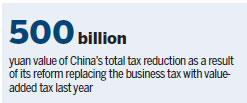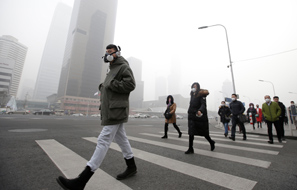Authorities respond to tax concerns
Departments and ministries under the State Council, China's Cabinet, responded to a series of public concerns in the past week, mainly concerning the corporate tax burden and prevention of urban flooding.
Officials of the Ministry of Finance responded to media reports concerning the taxation system. They pointed out that tax reform is designed to reduce enterprises' tax burden and particularly support the development of high-tech enterprises as well as enterprises in the economically less vibrant western regions.
Since 2008, China has launched a series of corporate tax reforms, which has reduced the statutory tax rate from33 percent to the international average of 25 percent. It has eliminated differentiated tax treatment between foreign and domestic enterprises, and provided several preferential tax rates to high-tech enterprises, qualified small and micro-sized enterprises as well as enterprises in the western regions.
Since 2009,China has launched pilot programs to replace business tax with value-added tax, and VAT reform was fully implemented last year, when the overall tax reduction due to VAT reform was about 500 billion yuan ($72.2 billion). China's standard rate of value-added tax is 17 percent, the global average.
As to arbitrary charges some enterprises have complained about, the ministry said it will strictly inspect and seriously deal with any violation of laws in local regions.
The ministry will release lists of legal charges on its official website and welcome public supervision of any illegal arbitrary charges.
The National Development and Reform Commission, the Ministry of Water Resources, and the Ministry of Housing and Urban-Rural Development jointly issued the 13th Five-Year Plan of Water Conservancy Reform and Development(2016-20),which has stipulated specific measures for coping with urban flooding.
Zhang Linwei, deputy head of the Ministry of Housing and Urban-Rural Development's urban construction department, said there are several major measures for dealing with urban flooding by 2020, including determining drainage standards, building "sponge cities" and enhancing construction of drainage and rain-storage facilities. He said that the construction of anti-flooding infrastructure in some urban areas is outdated, and central authorities will tackle deficiencies. In addition, the construction of"sponge cities", or new projects to better use the full potential of discharge systems to prevent flooding during heavy rain, should be promoted in the next five years.
Systematic management and arrangement are also required in urban areas, especially the big cities. For instance, the urban area of Beijing within the 5th-ring road is over 1,000 square kilometers and rainfall in Beijing is highly uneven, which requires focused management to make up for the deficiency of infrastructure and public facilities. 
























